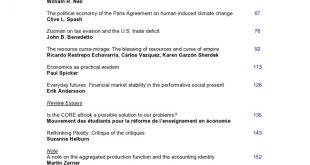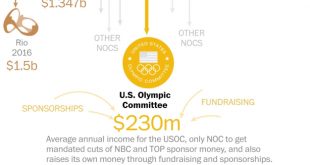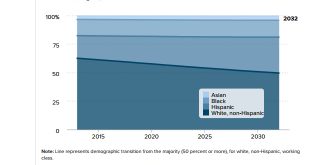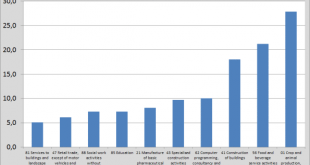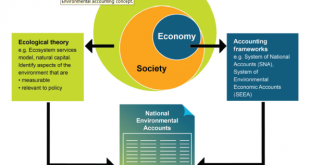from Mouvement des étudiants pour la réforme de l’enseignement en économie (MEPREE) France and RWER #75 “Students in economics all over the world were asking, just as I had asked a few years previously: why has the subject of economics become detached from our experience of real life?” (Camila Cea, Member of the CORE project, University of Chile.) AbstractThe CORE project is a response to students’ protests against teaching in economics. It wants “to make economics accessible and relevant...
Read More »“On economics as a science” – Paul Spicker
Much of social science has come to rely on a set of analytical approaches intended to identify specific influences within a range of confounding factors. The object of analysis is to separate the strands, to distinguish different influences, to attribute influence to particular variables. This has to be done in the face of multiple, competing influences. As a discipline, economics goes about this in different ways. The traditional approach of classical economics is theoretical and...
Read More »“I will row through shit for you, America.”
rom David Ruccio U.S. Olympic rower Megan Kalmoe doesn’t want to talk about water quality anymore. As she explained on her blog, journalists are ruining the 2016 Olympic games by being “fixated on shit in the water.” We are American, and we are going to Rio to represent you in this potentially flawed and imperfect setting that you are trying so desperately to get the public to love to hate. We are going to compete for medals to bring them home to you, and for you so that the US...
Read More »What next for the EU?
from Jayati Ghosh Even before the results of the UK referendum, the European Union was facing a crisis of popular legitimacy. The result, especially in England and Wales, was certainly driven by the fear of more immigration, irresponsibly whipped up by xenophobic right-wing leaders who now appear uncertain themselves of what to do with the outcome. But it was as much a cry of pain and protest from working communities that have been damaged and hollowed out by three decades of neoliberal...
Read More »Commodification of science and technology
from Maria Alejandra Madi At the beginning of XX century, Joseph Schumpeter developed the concept of creative destruction to characterize the waves of development based on clusters of innovations -both technical and institutional. In the last decades, these waves have included petrochemical products, automobiles, information technologies and biotechnologies, especially genetic modification. Looking back, throughout the postwar era in advanced Western societies, scientific research and...
Read More »Class struggles in America (6 graphs)
from David Ruccio Almost five years ago, I suggested we start calling things by their correct names. Take the working-class—people who are forced to have the freedom to sell their labor power for a wage. We refer to them as members of the middle-class (which needs to be “rebuilt“) and working families (who need to be helped) or, now as workers’ wages stagnate and the real value of the minimum wage declines, as the “feral underclass” (especially in theUK, in the aftermath of the...
Read More »Job growth in Ireland. Meuhhh…
According to the Irish Statistical Office, economic growth in 2015 was an unbelievable 26%. At the same time, employment increased with 2,4% or 151.000 jobs. A brisk but not exceptional pace and totally at odds with the 26% economic growth estimate. Subsectoral data underscore this anomaly: job growth was located in agriculture, tourism (food and beverage service activities) and construction. And to a much smaller extent in the computer, pharmaceutical and leasing sectors which showed,...
Read More »Capital links. Nature, France and a Marxist DSGE model
1) What is capital? The national accounts define capital as a monetary variable. Many people however also talk about ‘natural capital’, ‘The stock of living and non-living components of the earth that provide a flow of valuable ecosystem goods or services‘. That’s from the Australian Bureau of Meteorology, which has issued a very good report ‘The environmental accounts landscape‘. They may underestimate the extent to which laws and regulations shape ‘capital’. But here’s an interesting...
Read More »Children’s economics
from David Ruccio As I have argued many times on this blog, representations of the economy are produced and disseminated in many different spaces (in addition to academic economics departments) and through many different media (in addition to the usual, mostly mainstream economics textbooks). One example of this proliferation of economic representations is children’s literature. Children are the targets of educators and writers, most of whom (at least these days) are determined to make...
Read More »Is the Trans-Pacific Partnership President Obama’s Vietnam?
from Dean Baker The prospects for the Trans-Pacific Partnership (TPP) are not looking very good right now. Both parties’ presidential candidates have come out against the deal. Donald Trump has placed it at the top of his list of bad trade deals that he wants to stop or reverse. Hillary Clinton had been a supporter as secretary of state, but has since joined the opposition in response to overwhelming pressure from the Democratic base. As a concession to President Obama, the Democratic...
Read More » Real-World Economics Review
Real-World Economics Review

